Mythical Birds in Legends and Puranas
- April 1, 2022

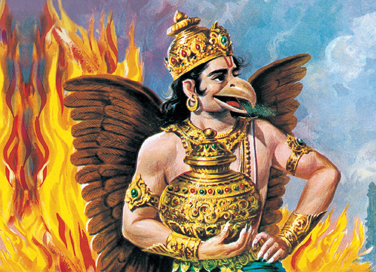
Mythical Birds in Legends and Puranas
- April 1, 2022
By Komal Narwani and Kayva Gokhale
Hindu mythology is full of divine beings that are not always humans, and yet play an integral role in the stories of the Puranas as well as the epics, Ramayana and Mahabharata. Folktales, regional mythologies and legends also have many such magical creatures, with fascinating origins and awe-inspiring powers. Here are some majestic birds that feature in Hindu mythology.
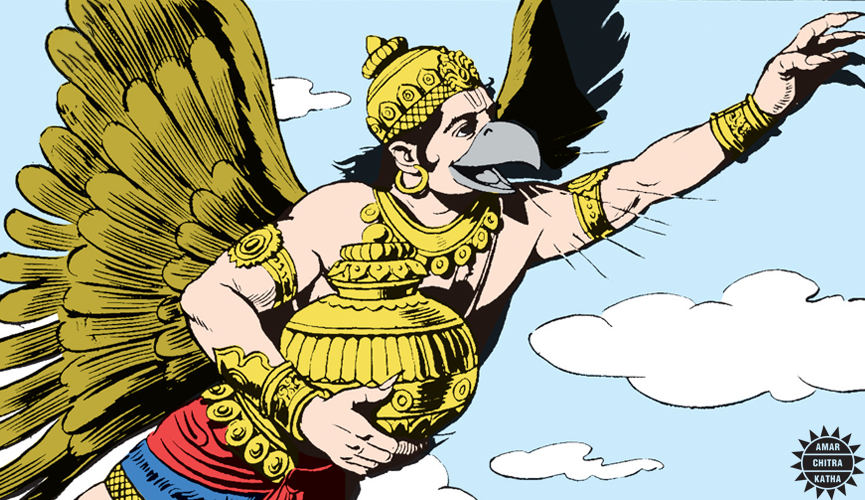
Garuda, the divine eagle, is widely known as Vishnu’s mount. However, he is no ordinary vahana and is a powerful divine being capable of fantastic feats. The story of Garuda’s birth is an interesting one. According to some legends, Sage Kashyap conferred a boon to his wives Vinata and Kadru. While Kadru asked to be the mother of a thousand mighty snakes, Vinata asked for only two sons, who would surpass Kadru’s children in strength. Soon, a yagna was conducted to grant the wives their wishes. During the preparation of this yagna, the sages were angered by Lord Indra’s arrogance. They were determined to make Vinata’s son stronger than Indra, in order to humble him. Frightened, Indra requested Sage Kashyap to help him. The great sage then requested the others to change their decision. ‘Let the being you create be the Lord of all winged creatures’, he suggested instead. The sages agreed and that is how Garuda came to be born with tremendous strength, the ability to change his form at will as well as the ability to increase his size and soar across the blue skies.
To receive more such stories in your Inbox & WhatsApp, Please share your Email and Mobile number.
This fascinating mythical being finds its mention in Oriya folklore based on the Mahabharata. It is believed that once when Arjuna was out hunting, he came across a creature beyond his imagination. It was made up of nine animals! This magnificent creature had the head of a rooster, the neck of a peacock, the hump of a bull, the waist of a lion, legs of a human, an elephant, a deer and a tiger, and with a snake as its tail. Though initially frightened of Navagunjara, Arjuna soon realised that such a being could only be a manifestation of the divine. Arjuna laid down his weapons and saluted the wondrous creature.
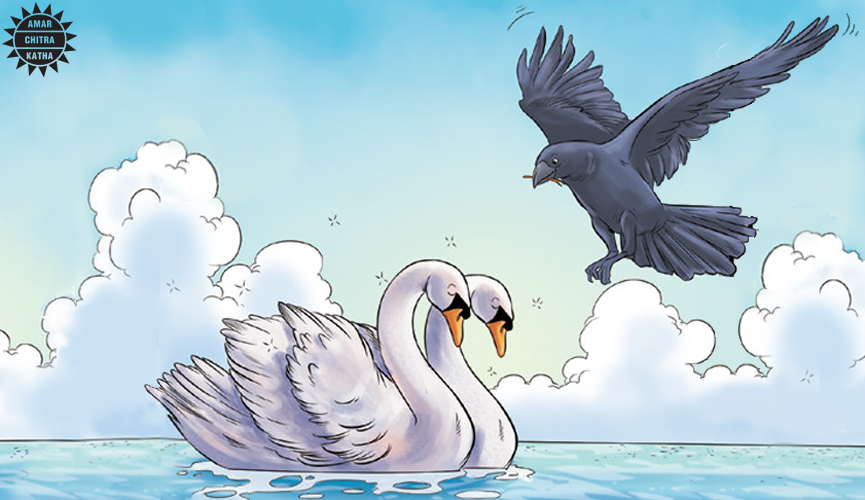
According to the Santhal tribe’s mythology, birds play an important role in the creation of the world. It is believed that when the Earth was covered with water, Marangbonga, the divine crow, was flying through the sky one day when he decided to create living creatures. He then created a pair of swans, called the Hanshansali, who became the first living beings on the earth. This swan couple eventually laid two eggs, out of which a man called Pilchuharam and a woman called Pilchuayo were born. These were the first humans for whom the earth was made habitable by the Gods. Thus, the crow and swans are seen as imperative for the beginning of mankind.
Long ago, the king of Usheerabeeja, Marutta was performing a Mahesvarayajna. Many gods including Indra, Yama, Varuna and Kubera, were present at the yajna. Suddenly, Ravana, the king of Lanka, who had received the boon of near-invincibility from Brahma, arrived at the yajna. Scared of Ravana’s presence, all the demi-gods assumed the form of different animals and birds. Indra became a peacock, Yama transformed into a crow, Varuna took the form of a swan and Kubera turned into a chameleon. The animals had saved the demi-gods from Ravana’s wrath. Hence, when Ravana left the place, each of them blessed the animals and birds they took the form of. Indra made the peacock’s feathers iridescent. Yama gave crows the right to have Pitru Bali Rice/Pinda, a ritual to leave food outside the house for the dead as an offering to Yama. Varuna blessed the Swan with pure white colour. Kubera gifted the chameleon the capability to change its colour.
The great vultures, Sampati and Jatayu, were brothers. Both of them were fond of flying at dizzying heights. They would often fly up to meet their father, Aruna, the sun god’s charioteer. Although proud of his mighty sons, Aruna would advise them not to get too close to the sun god. Unfortunately, his advice went unheeded. One blazing afternoon, the two brothers unknowingly ended up flying extremely close to the sun. Their bodies were burning but Jatayu continued to fly higher. It was Sampati who noticed the sun god approaching them. Sampati flew over Jatayu and spread his wings wide to shield his brother. The flames ate up Sampati’s wings and he hurtled to the ground in pain, sacrificing himself for his beloved brother.
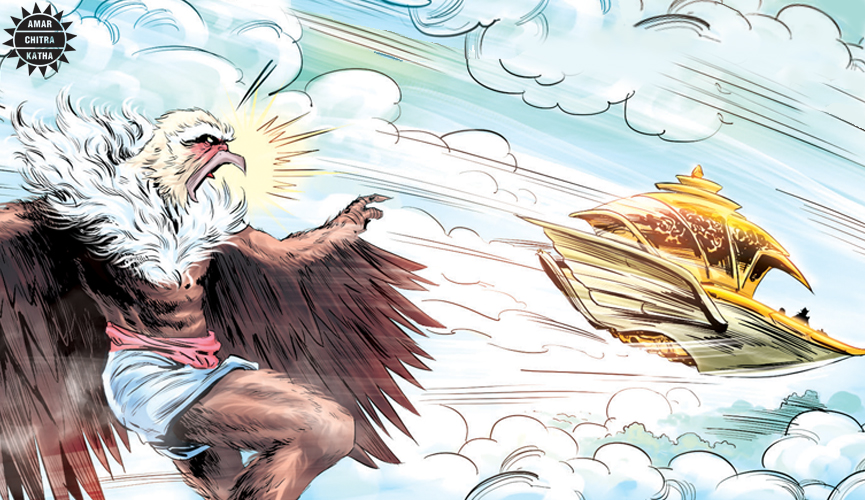
Jatayu was the second son of Aruna, the sun god’s charioteer, and nephew of Garuda, the mount of Vishnu. He was the great vulture who dedicated his life to saving Dasharatha, the king of Ayodhya, and his family. When Ravana, the king of Lanka, abducted Sita, the princess of Mithila and the wife of King Rama, during their exile. Jatayu was the first to notice. Upon hearing Sita’s cry for help, Jatayu speeded his way to face the deadly foe with all his might. Though Jatayu was a might vulture, his strength couldn’t match up to Ravana’s, who mercilessly cut off Jatayu’s wings and talons. Even after Jatayu was severely injured, he held on to life until he broke the terrible news about Sita’s abduction to Rama. He breathed his last only after uttering Sita’s location to Rama and Lakshmana.
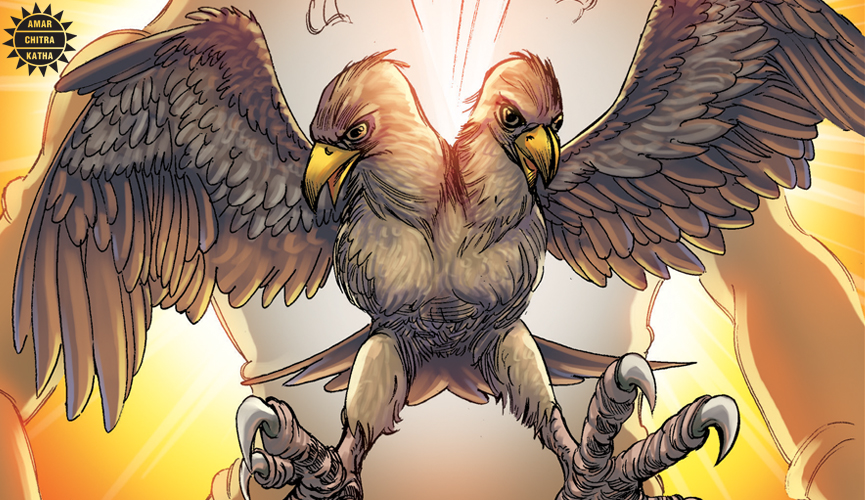
When Vishnu descended to earth as Narasimha to destroy the evil king, Hiranyakashapu, he lost sight of his true purpose and started to wreak havoc on earth. Even the gods feared him and turned to Shiva for help. Shiva took the form of Sharabha, a half-bird and half-lion being. Sharabha tried to calm Narasimha under his wings but instead, got him furious. From his body emerged Gandaberdunda, a two-headed bird of unimaginable strength. The two divine beings fought a fierce battle that lasted for eighteen days. At the end of the eighteenth day, Gandaberunda stopped to look around. Realizing the enormous devastation the battle had caused, he spilt into two and Vishnu emerged from the centre of the fearsome beast. Shiva too resumed his form. The two returned to the heavenly abode and peace was restored.
Read about more such fascinating creatures in our title Divine Beings on the ACK Comics app!
To receive more such stories in your Inbox & WhatsApp, Please share your Email and Mobile number.

Comic of The Month
The Naval Journey of India Book I
This book is the first of a three-book series that takes a deep and detailed look at India's Naval History and a deep insight into the lives of our men and women in white. But any series on the Indian Navy has to start at the very beginning - exploring India's celebrated maritime history. Join our little hero, Bharat, and his grandfather, Commodore Sagar, as they sail into the deep blue waters of time. Book I of The Naval Journey of India takes a sweeping look at India's maritime endeavours, how the seas impacted us over millennia and how the oceans made us who we are.